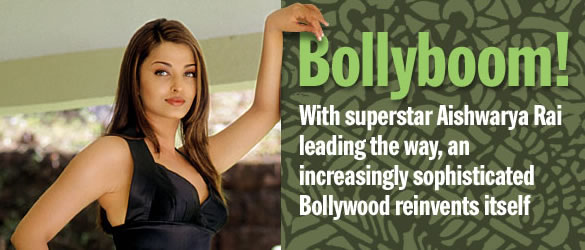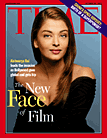
TIME: How do you choose your roles? You seem
to be getting pickier.
Rai: I'm a student. I want to do better, and I want directors
who can find the actress in me and be my teachers. I'm interested
in the whole process of editing, post-production and direction.
With each film, I get more and more involved and it's more and
more time-consuming.
Also, I like to break myths and people's preconceived ideas. My
characters have always stood for something, have always had an
opinion, although they've never really rebelled.
As for being picky, in the beginning, I did get a bit caught up
in the way the industry functions at top speed. I was never fast-paced
in the way I work. Initially, I was working on several films at
a time, then I would work on a maximum of two to three films a
year and by Devdas I had slowed down to two, and now, this is
my seventh year, I have slowed down even more. Three years ago
I was on a world tour, a promotional tour, with [The Rising co-star]
Aamir Khan. I was at my first show with him and I was saying,
"Aamir, I really want to work much more selectively."
He asked me how long I had been acting and I said "Four years."
He said, "It took me six years to get to even vaguely working
the way I wanted."
TIME: How do you feel about becoming a world star?
Rai: For me, it's not about breaking big in Hollywood, but having
interesting experiences. In July 2002 I met [Bride and Prejudice
director] Gurinder Chadha and in October I went to the States—I
had just had a very positive experience in Cannes and from the
European media—and I went and met with the agencies and
it just snowballed. Last summer, I had meetings with Robert de
Niro and Roland Joffe and Mike Leigh. They'd say, "When are
you available? And I'm like, "Maybe at the end of next year."
And they're like, "Wow, you can't be serious." But that's
my life right now.
I really don't work to a plan, but I just do what interests me
and what I like to do. Gurinder had great ethics and goodwill
and I like what she had to offer.
TIME: Are you trying to move away from traditional Bollywood song
and dance romances? What do you make of the "New Bollywood"?
It seems to be generating a lot of interest in the West.
Rai: I am very happy with our cultural backdrop and the backdrop
of our cinema and participating in a movement to project our cinema
internationally. Cinema is cinema, but for some reason in the
world arena, Indian cinema is slotted into its own small category.
People are breaking the stereotype and it's good that Indian cinema
is being recognized. Now is the time and there are actors like
me who are willing to support that change. But it's unfair to
say that Indian cinema is "arriving." Indian cinema
has been delivering a certain aesthetic to its audience very successfully
for years and I can say without any shame that I love song and
dance. I'd hate to see that disappear and as an artist I am happiest
to put my all into an art form, as you do with song and dance.
Maybe the world is just becoming more aware of our culture.
TIME: Why did Bollywood stay in the same rut
for so long?
 Rai: For a long time, cinema has been the biggest form of entertainment
in India. And the larger body of India has such hard lives that
when they go to the cinema, they want to be transported, to see
a world of hope and color and positivity, the innocent, beautiful
fairytale. It's the chance to be transported from the toil and
the worry, the chance to feel good about life again. Boy meets
girl, a bad guy comes along, but everything is sorted out in the
end. It's the innocence of Life is Beautiful. Song and dance sequences
create that mood. It's beautiful in its own way. In Bollywood,
it's always a happy ending.
Rai: For a long time, cinema has been the biggest form of entertainment
in India. And the larger body of India has such hard lives that
when they go to the cinema, they want to be transported, to see
a world of hope and color and positivity, the innocent, beautiful
fairytale. It's the chance to be transported from the toil and
the worry, the chance to feel good about life again. Boy meets
girl, a bad guy comes along, but everything is sorted out in the
end. It's the innocence of Life is Beautiful. Song and dance sequences
create that mood. It's beautiful in its own way. In Bollywood,
it's always a happy ending.
TIME: Are you aware that half a billion Indian men think you're
the perfect woman?
Rai: Is this an image I'm working hard to live up to? No, I have
always just been... I am human. If I was really trying to live
up to that perception of me, that would be too much pressure.
Then more fame you have, the more input and hard work there is.
I have so little time to myself and for my sanity. But no, I'm
not acting to an image. I have to get into another character enough
in front of the camera. If people think I am just an image, they're
wrong. I'm just being the girl I was brought up to be.
TIME: How do you cope with the pressure?
Rai: Is there pressure? Well, there is the sheer pace of my life
these days. Premieres, festivals, interviews, press conferences,
there is less and less time for yourself. And you do feel it.
They only way I'm OK, the only way I keep sane as I have immense
faith in God and my friends. But if you do not perceive the pressure,
it's not there. It's all about conditioning yourself. And hey,
I can always choose to do something else. I just go with the flow
and try to recognize the reality of it all. It's really not something
I worry about. I only think about it when I'm asked. I'm just
too busy. I like my work, and I'm true to it; and apart from that,
I'm just being.
TIME: Is that really possible in your position?
Rai: I have to learn to be light on myself. I could be really
disappointed and hurt by what is said about me: all this trivial
stuff about wardrobes and if I was wearing huge gowns, would it
cover up my plaster? [Rai fractured an ankle this year.] But I
cannot work myself into a knot and hurt about it. But when I went
abroad, it was such a humbling experience, it was a fabulous experience
and people were amazing with me. People have been wonderful. The
response I have been accorded has been humbling. So I said, "Alright
God, I get the message. Go with the flow."
[Editor's Note:
All credits to TIME ASIA except for Lagaan poster. Title herein
is by editor. Interview conducted by Alex Perry.]

 Rai: For a long time, cinema has been the biggest form of entertainment
in India. And the larger body of India has such hard lives that
when they go to the cinema, they want to be transported, to see
a world of hope and color and positivity, the innocent, beautiful
fairytale. It's the chance to be transported from the toil and
the worry, the chance to feel good about life again. Boy meets
girl, a bad guy comes along, but everything is sorted out in the
end. It's the innocence of Life is Beautiful. Song and dance sequences
create that mood. It's beautiful in its own way. In Bollywood,
it's always a happy ending.
Rai: For a long time, cinema has been the biggest form of entertainment
in India. And the larger body of India has such hard lives that
when they go to the cinema, they want to be transported, to see
a world of hope and color and positivity, the innocent, beautiful
fairytale. It's the chance to be transported from the toil and
the worry, the chance to feel good about life again. Boy meets
girl, a bad guy comes along, but everything is sorted out in the
end. It's the innocence of Life is Beautiful. Song and dance sequences
create that mood. It's beautiful in its own way. In Bollywood,
it's always a happy ending.